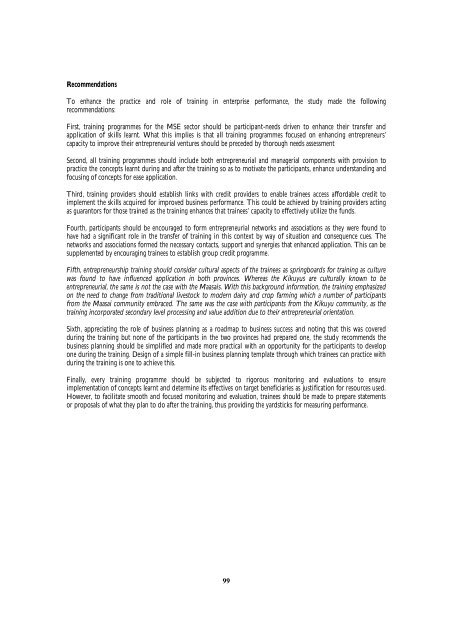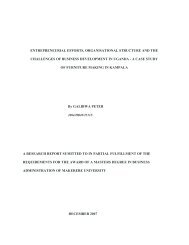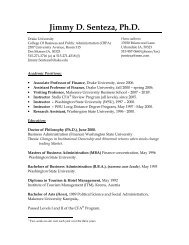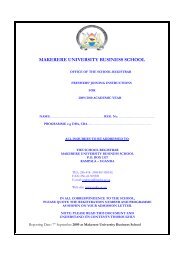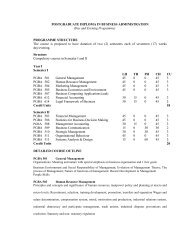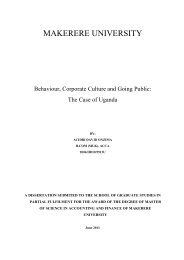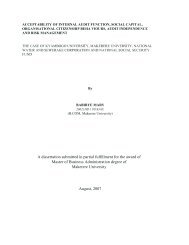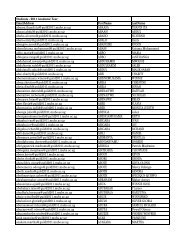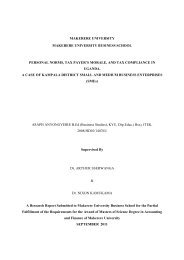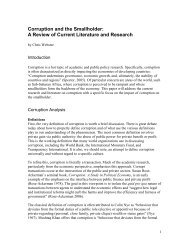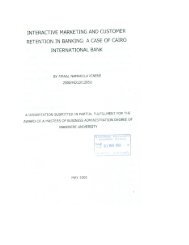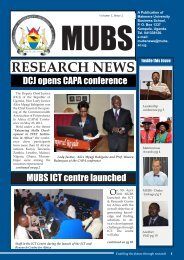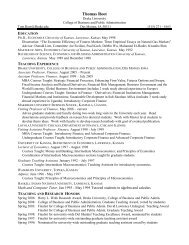Recommendations To enhance the practice and role of training in enterprise performance, the study made the following recommendations: First, training programmes for the MSE sector should be participant-needs driven to enhance their transfer and application of skills learnt. What this implies is that all training programmes focused on enhancing entrepreneurs’ capacity to improve their entrepreneurial ventures should be preceded by thorough needs assessment Second, all training programmes should include both entrepreneurial and managerial components with provision to practice the concepts learnt during and after the training so as to motivate the participants, enhance understanding and focusing of concepts for ease application. Third, training providers should establish links with credit providers to enable trainees access affordable credit to implement the skills acquired for improved business performance. This could be achieved by training providers acting as guarantors for those trained as the training enhances that trainees’ capacity to effectively utilize the funds. Fourth, participants should be encouraged to form entrepreneurial networks and associations as they were found to have had a significant role in the transfer of training in this context by way of situation and consequence cues. The networks and associations formed the necessary contacts, support and synergies that enhanced application. This can be supplemented by encouraging trainees to establish group credit programme. Fifth, entrepreneurship training should consider cultural aspects of the trainees as springboards for training as culture was found to have influenced application in both provinces. Whereas the Kikuyus are culturally known to be entrepreneurial, the same is not the case with the Maasais. With this background information, the training emphasized on the need to change from traditional livestock to modern dairy and crop farming which a number of participants from the Maasai community embraced. The same was the case with participants from the Kikuyu community, as the training incorporated secondary level processing and value addition due to their entrepreneurial orientation. Sixth, appreciating the role of business planning as a roadmap to business success and noting that this was covered during the training but none of the participants in the two provinces had prepared one, the study recommends the business planning should be simplified and made more practical with an opportunity for the participants to develop one during the training. Design of a simple fill-in business planning template through which trainees can practice with during the training is one to achieve this. Finally, every training programme should be subjected to rigorous monitoring and evaluations to ensure implementation of concepts learnt and determine its effectives on target beneficiaries as justification for resources used. However, to facilitate smooth and focused monitoring and evaluation, trainees should be made to prepare statements or proposals of what they plan to do after the training, thus providing the yardsticks for measuring performance. 99
References 1. Baldwin, T. T., & Ford, J. K., (1988). Transfer of training: A review and directions for future research. Personnel Psychology, 4(1), 63-105. 2. Baldwin, T. T. & Magjuka, R. J. (1991). Organizational training and Signals of importance: Linking pretraining Perceptions to intentions to Transfer. Human Resource Development Quarterly, 2(1), 25 – 36. 3. Broad, M. L., & Newstrom, J. W., (1992). Transfer of Training. Reading, Massachusetts: Addison-Wesley. 4. Cohen, D. J. (1990). What motivates trainees. Training and Development Journal. P. 91- 93 5. Denzin, N. K., & Lincoln, Y. S., (1994). Methods of collecting and analyzing empirical materials. In N. K. Denzin & Y. S. Lincoln (Eds). Handbook of qualitative research (p. 353-360). Thousand Oaks, CA: Sage. 6. Denzin, N. K., & Lincoln, Y. S. (Eds.), (2000). Handbook of Qualitative Research, Thousand Oaks, CA: Sage. 7. Fenwick, T. J. , & Parsons, J., (2000). The art of evaluation, Toronto, Canada: Thompson Educational Publishing, Inc. 8. Fluitman, F., (1989). "Training for Work in the Informal Sector": An Agenda for the 1990s: I.L.O., Geneva. 9. Ford, J. K., (1994). Defining transfer: The meaning is in the answers. Adult Learning, 5 (4), 23-30 10. Garavaglia, P. L., (1993). How to ensure transfer of training. Training & Development, 47 (10), 63-68. 11. Gibb, A.A., 1991: "Defining success in entrepreneurship Development Programmes": A guide to a Model Approach: I.L.O., Geneva. 12. Goldstein, T. L. (1993). Training in Organizations (3 rd ed.). Pacific Grove, CA: Brooks/Cole 13. Harper, M., 1983: "Selection and Training for Entrepreneurship Development": I.L.O., Geneva. 14. Hicks, W. D. & Klimoski, R.J. (1987). Entry into training programs and its effects on training outcomes. Academy of <strong>Management</strong> Journal. 30(30) 542-552. 15. Holton, E. F. III., (1996). The flawed four level evaluation model. Human Resource Development quarterly 2(1) 36 -52 16. Kirkpatrick, D. L., 1979: Techniques for Evaluating Training Programmes. Training and Development Journal, 33(6), 78-92. 17. Kirkpatrick, D. L., (1996). Evaluating Training Programmes. San Francisco: Berrett-Koehler 18. Louks, K., (1987) Training Entrepreneurs for Small Business Creation: Lessons from Experience: I.L.O., Geneva. 19. Machin, M. A., & Fogarty, G. J., (1997). The effects of Self-efficacy, Motivation to Transfer, and Situational constraints on Transfer of Intentions and Transfer of Training: Performance Improvement Quarterly, 10(2), 98-115. 20. Marshall, C. & Rossman, G. B., 1989: Designing Qualitative Research. Newbury Park, CA: Sage. 21. Merriam, S. B., 1988: Case Study Research in Education: A Qualitative Approach. San Francisco: Jossey-Bass. 22. Noe, R. A., & Schmitt, N., (1986). The Influence of Trainee Attitudes on Training Effectiveness: Test of a model. Personnel Psychology, 39, 497-523. 23. Oakland, J. S., (1999). Total Quality <strong>Management</strong>: Text with Cases, Chesire, UK 24. Osborne, D., (1996). Staff Training and Assessment, New York, USA. 25. Patton, M. Q., (1990). Qualitative evaluation methods (2 nd Ed.). Newbury Park, CA: Sage. 26. Paul, S., Ickis, J. C., & Levitsky, J., (1989). Educating Managers for Business and Government: A Review of <strong>International</strong> Experience (World Bank Discussion Papers). Washington, DC: The World Bank. 27. Pennington, N. & Rehder, B., (1995). Looking for Transfer and Interference. In D. L. Medin (Ed.), the Psychology of learning and motivation, 33, 223-289. 28. Sriyan de Silva, (1997). Developing the Training Role of an Employers' Organization, I.L.O., Geneva. 29. Tannenbaum, S. L. & Yukl, G. (1992). Training and Development in work organizations. <strong>Annual</strong> Review of Psychology, 43, 399-441. 30. Zemke, R., & Gunkler, J., (1985). Twenty-eight techniques for transforming training into performance. Training in Business and Industry, 22(4), 48-57. 100
- Page 1 and 2:
Gender diversity on the Board, Inte
- Page 3 and 4:
its own. Relationship-based assets
- Page 5 and 6:
Boards, for example, enable the fir
- Page 7 and 8:
H7: Firms with diverse boards are i
- Page 9 and 10:
29. Johnson, J., Daily, C., and Ell
- Page 11 and 12:
population in Kenya especially in a
- Page 13 and 14:
John Adair highlighted the importan
- Page 15 and 16:
PRACTICAL ANALYSIS TO RESOLVING KEY
- Page 17 and 18:
SUB-THEME : SOCIO-CULTURAL ISSUES A
- Page 19 and 20:
ecognize and nourish their capabili
- Page 21 and 22:
threatened by increased dynamism in
- Page 23 and 24:
2.0 THEORETICAL FRAMEWORK At the ro
- Page 25 and 26:
2.1 Dynamics of Entrepreneurial Dev
- Page 27 and 28:
FIGURE I: THE ROLE OF KENYA INSITIT
- Page 29 and 30:
4.2.3 Researches Services This is a
- Page 31 and 32:
Source: GOK, Central Bureau of Stat
- Page 33 and 34:
with regard to training, research a
- Page 35 and 36:
REFERENCES 1. Balunywa Waswa, (2004
- Page 37 and 38:
APPENDIX I: SCHEDULED PROGRAMMES RU
- Page 39 and 40:
economy activities that include one
- Page 41 and 42:
III. SMALL AND MEDIUM ENTERPRISE (S
- Page 43 and 44:
two professors used a survey questi
- Page 45 and 46:
V. RECOMMENDATIONS : ADDRESSING THE
- Page 47 and 48:
16. International Finance Corporati
- Page 49 and 50:
DEVELOPING INTRAPRENEURSHIP IN SMAL
- Page 51 and 52:
� Innovators � Leaders � Inde
- Page 53 and 54:
The intrapreneur is really the corp
- Page 55 and 56: Figure 1 The Model of Intrapreneurs
- Page 57 and 58: 1. Leadership - Any organizational
- Page 59 and 60: to (Kolveried and Amo, 2002). This
- Page 61 and 62: REFERENCES 1. Antoncic, Bostjan and
- Page 63 and 64: 39. Kibas, Peter B. and George O. K
- Page 65 and 66: 75. Whitehead Martin (2004). Rescue
- Page 67 and 68: Perceived desirability Perceived fe
- Page 69 and 70: experience empathy is a social entr
- Page 71 and 72: ATTITUDES (Behavioral beliefs x Out
- Page 73 and 74: Sociologists and organizational the
- Page 75 and 76: accountability. They assess their p
- Page 77 and 78: DETERMINANTS OF AGRICULTURAL OUTPUT
- Page 79 and 80: The Objective of the study The obje
- Page 81 and 82: A production function portrays an i
- Page 83 and 84: But, Y � ax j i i bi xj b ui je .
- Page 85 and 86: Land Land size and land fragmentati
- Page 87 and 88: Agricultural Extension Because of l
- Page 89 and 90: REFERENCES: 1. Chambers R. (1983) R
- Page 91 and 92: The training approach to small ente
- Page 93 and 94: Topic of Training No. of Respondent
- Page 95 and 96: Key to Figure A - More capital inve
- Page 97 and 98: Conclusion programmes were implemen
- Page 99 and 100: Bibliography 1. Abrahamson, R and H
- Page 101 and 102: whether those trained start their o
- Page 103 and 104: Changes were also noted in business
- Page 105: Conclusions From the findings, ther


